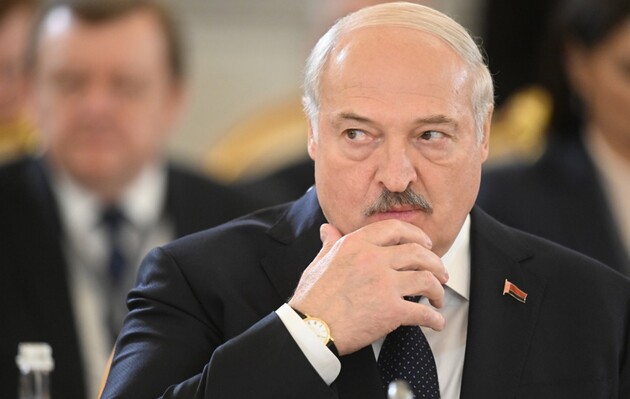Who is Lukashenko preparing to fight with and will he send troops to Ukraine?
The self-proclaimed President of Belarus Alexander Lukashenko again reminded of his presence. This time, declaring that Belarus does not want to fight, but is preparing for war. “Don’t believe anyone that we want to fight. We are preparing for war, I speak about this frankly. “If you want peace, then you need to prepare for war” – I didn’t come up with that. This is very correctly said,” Lukashenko noted. According to him, the republic is conducting the necessary training for the relevant units, and various types of weapons and equipment are being supplied to the troops.
Before this, Lukashenko had already discussed with the commander of the North-Western Operational Command, Alexander Naumenko, a possible attack on the Suwalki corridor, namely the territory of Lithuania and Poland, located between Belarus and the Kaliningrad region of the Russian Federation. And from April 5, Belarus is undergoing another check of the combat readiness of the armed forces. At the same time, Lukashenko introduced SMS summonses and made the punishment for army evaders more severe.
So what kind of war is Lukashenko preparing for? And what should Ukraine prepare for? And also, what should the member countries of the North Atlantic Treaty Organization (NATO) and, above all, Poland, Latvia, Lithuania and Estonia expect? Is it worth preparing for the fact that Russian troops will again invade our country from the territory of Belarus or attack member states of the Alliance, and Belarusian soldiers will be among the aggressors? Judging by Lukashenko’s contradictory words, such a threat cannot be ruled out.
In a commentary to ZN.UA, the experts interviewed assessed the statements of the self-proclaimed President of Belarus differently.
Artem Shraibman, a visiting expert at the Berlin Carnegie Center, draws attention to the fact that Lukashenko did not say anything new: in one variation or another, he constantly talks about war.
The editor-in-chief of the online publication Charter-97, Natalya Radina, argues that the self-proclaimed president must be taken literally: he threatens both Ukraine and the West, preparing for an attack.
People's Deputy of Ukraine Bohdan Yaremenko, who has been studying the Belarusian case for many years, believes that Lukashenko's statements are a demonstration of loyalty to the Russian leader and an element of his game with Putin. The goal of this game is to stay alive and in power.
Today Lukashenko is viewed as an absolutely dependent figure, ready to do whatever Putin orders. There is some truth in this assessment: since August 2020, when Minsk found itself in international semi-isolation, Lukashenko’s personal dependence on the Kremlin owner has increased sharply. In fact, Belarus’ dependence on Russia has also increased, although Minsk is trying to dilute these patron-client relations by developing contacts with China, Arab monarchies and African states.
As Artem Shraibman noted, 65% of Belarusian commodity exports go to Russia, and a significant part of the remaining third of exports depends on Russian logistics – roads, railways, ports. The reality is that the Russian Federation actually subsidizes the Belarusian economy, and the amount of Belarusian debt to Moscow exceeds $8 billion. Such dependence narrows Lukashenko’s room for maneuver: for each new tranche or deferment in loan repayment, he is forced to make ever greater concessions.
“His regime exists thanks to the Kremlin,” states Natalya Radina. At the same time, Lukashenko has a certain autonomy in domestic politics, economics, and personnel decisions. But the degree of autonomy should not be exaggerated. “It ends when it comes to the defense sector, military and geopolitical interests of the Russian Federation. And we must not forget that the Russian authorities consider the independence of Belarus, as well as Ukraine, to be simply a misunderstanding,” notes Artem Shraibman.
At the same time, the question remains open to what extent Lukashenko controls the Belarusian security forces. It is also unknown how the army, internal troops and intelligence services will behave if the Kremlin wants to establish full control over the second part of the Union State, putting its own man at the head of Belarus: will they be loyal to the self-proclaimed president? Or will they come under Russian banners? As Schreibman noted, “it’s difficult to gauge sentiment in such a closed system.”
However, so far the Kremlin has not made any attempts to remove Lukashenko, with whom Putin is now enjoying a period of warm and friendly relations.
Apparently, these relations did not spoil Lukashenko’s revelation, who stated that the suspects in the terrorist attack at Crocus City Hall “could not have entered Belarus in any way. They saw it. Therefore, we turned away and went to the section of the Russian-Ukrainian border.” These words completely nullified Putin’s false version that the terrorists “tried to escape and moved towards Ukraine, where a “window” had previously been prepared for them to cross the border.”
According to experts, Lukashenko let slip the terrorists’ plans to cross the Belarusian border because he wanted to demonstrate his own importance to the domestic audience with such PR, providing assistance to Russia and Putin. In particular, Bohdan Yaremenko believes that in this way the self-proclaimed president of Belarus is trying to “remind of his presence, show that he is still needed.”
Of course, the role of the client does not suit Lukashenko: he sees his dependence on the Kremlin as a threat to himself, his family, and his power. But after the 2020 elections, Lukashenko deprived himself of the opportunity to lead an independent party, playing on the contradictions between Russia and the West. As a result, the policy of his authoritarian regime, undergoing a natural drift, is becoming increasingly pro-Russian. At the same time, there is still some room in the official narrative for statements about an independent Belarus.
Lukashenko, concerned about the stability of his regime, has at every cost avoided allowing the Belarusian military to directly participate in the invasion of Ukrainian territory. And he succeeds in this decision. One of the reasons is that the Russian-Ukrainian war is extremely unpopular in Belarusian society: as Shraibman notes, according to opinion polls, no more than 5% of Belarusians want to participate in the war with Ukraine. Another reason is that the Belarusian army is small in number, and Moscow is successfully implementing plans to mobilize Russians.
“The price for such behavior by Russia’s ally was that Belarus turned out to be a springboard for Russian Battalion Tactical Groups (BTGs) advancing on Kyiv, a base for Russian aircraft that shelled Ukrainian cities and villages,” notes Bohdan Yaremenko. In turn, Natalya Radina draws attention to the fact that Belarus provides training grounds for Russian contract soldiers and mobilized ones. According to her, the next group of Russian military personnel is expected to come to her country for training in the spring and summer.
Moreover, although Belarusian troops are not participating in the Russian invasion, and there are no large Russian units in Belarus itself today, there is a constant risk of a new Russian offensive from Belarusian territory. So far there is no threat of invasion from the north. But what will happen in the summer? In general, Minsk plays its role in Moscow’s military plans, forcing Kyiv to pull back part of the Ukrainian reserves, which are so necessary in the Avdiivskyi, Zaporizhskyi, Lymanskyi and other directions, to protect its northern border.
In addition, as Artem Shraibman noted, Russia uses Belarus, firstly, as a production base for fulfilling defense orders for the Ministry of Defence of the Russian Federation. Secondly, Russia uses Belarus as a source of replenishment of military equipment and weapons. Thirdly, for the Russian Federation, Belarus has turned from a tactical springboard in the Russian-Ukrainian war into a strategic platform for confrontation with the West and the North Atlantic Treaty Organization (NATO). Putin achieved this, including by placing tactical nuclear weapons on Belarusian territory.
Apparently, for now Putin is satisfied with such a passive role of Belarus in the Russian-Ukrainian war. Otherwise, he would have done everything to force Lukashenko to take direct part in the hostilities. In turn, the self-proclaimed president of Belarus will do everything to avoid direct intervention of his country in the war. After all, the situation in 2024 is different from 2022: this time Ukraine will not tolerate attacks on its territory, but will strike back.
But although Lukashenko tries to stay away from direct participation in the invasion of Ukraine, and even more so from a possible attack on countries that are NATO members, there is always the possibility that something will go wrong.
Please select it with the mouse and press Ctrl+Enter or Submit a bug












 Login with Google
Login with Google